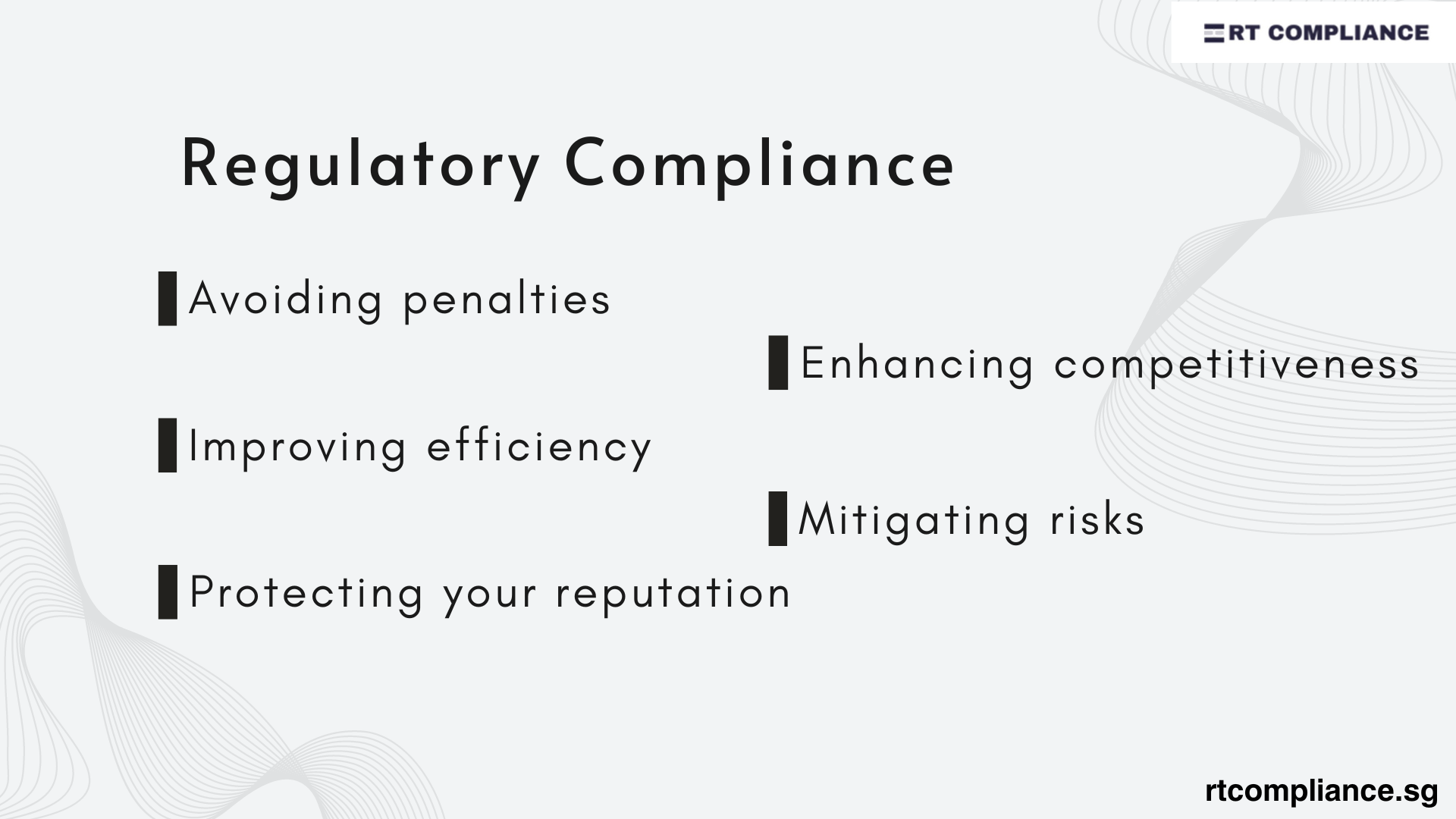Keeping up with regulatory compliance can be daunting for many businesses, but it’s especially challenging for small businesses and start-ups. The ever-changing landscape of regulations can be difficult to keep track of, and the consequences of non-compliance can be severe. We will discuss the various compliance requirements for businesses in Singapore. We will also provide tips on staying compliant and avoiding penalties.
What is Regulatory Compliance in Singapore?
In Singapore, regulatory compliance is a legal obligation for all businesses, regardless of size or industry. Depending on your business structure, you must meet various regulatory obligations set by government bodies such as MAS, ACRA, and PDPC. Ensuring compliance in Singapore helps protect your operations from legal, financial, and reputational risks.
Failure to comply with any regulation can lead to heavy penalties, including fines and jail terms. Sometimes, businesses may need to suspend operations or close down completely.
Thus, businesses must be aware of the various regulations they must comply with. They should also put in place compliance policy, process and systems to ensure compliance.
Benefits of Regulatory Compliance for Singapore Businesses
Complying with the Singapore compliance framework offers several advantages, such as avoiding fines, improving operational efficiency, and protecting your business’s reputation. A robust regulatory compliance program in Singapore also enhances trust among stakeholders and positions your company as a reliable and legally compliant business entity
- Avoiding penalties: Non-compliance can result in hefty fines and other penalties.
- Improving efficiency: A well-run compliance program can improve your organization’s overall efficiency.
- Protecting your reputation: A robust compliance program can help protect your organization’s reputation in an incident.
- Enhancing competitiveness: In some industries, regulators may give preferential treatment to compliant organizations.
- Mitigating risks: Compliance can help mitigate various risks, such as financial, legal, and reputational risks.
Types of Regulatory Compliance in Singapore by Sector and Industry
Businesses must adhere to many different types of regulatory compliance in Singapore. These include compliance with the Securities and Futures Act, the Singapore Companies Act, the Personal Data Protection Act, and the Moneylenders Act, among others.
Each of these Acts has different business requirements, and failure to comply with any of them can result in severe penalties. For example, under the Securities and Futures Act In Singapore businesses must disclose material information about their financials and business operations promptly and accurately. The Companies Act requires businesses to keep proper accounting records and submit annual returns to the Registrar of Companies.
The Personal Data Protection Act protects individuals’ data from mishandling by businesses. Under this Act, businesses must take reasonable steps to protect the personal data they collect from individuals. They must also provide individuals with access to their data upon request and allow them to make corrections to inaccurate data.
The Moneylenders Act regulates the activities of moneylenders in Singapore. Under this Act, moneylenders must be licensed by the Ministry of Law before operating. They are also subject to strict rules on advertising their services and conducting loan collection activities.
Compliance with all these Acts is essential for businesses operating in Singapore. Please note non-compliance can result in heavy fines or even imprisonment. Therefore, businesses need to seek professional advice on how to ensure compliance with all applicable laws.
How to Ensure Regulatory Compliance in Singapore: A Step-by-Step Guide
To comply with regulations in Singapore, businesses must first understand the regulations. There are three main categories of regulations: industry-specific, sector-specific, and general business.
Industry-specific regulations are those that apply to a particular industry. For example, the construction industry is regulated by the Building Control Act. To operate legally in Singapore, businesses in the construction industry must comply with these regulations.
Sector-specific regulations are those that apply to a particular sector of the economy. For example, the finance sector is regulated by the Monetary Authority of Singapore. Businesses in the financial sector must comply with these regulations to operate legally in Singapore.
General business regulations apply to businesses regardless of industry or sector. These include regulations like the Companies Act and the Employment Act. All businesses must comply with these regulations to operate legally in Singapore.
Compliance with regulatory requirements is a complicated and daunting task for businesses. However, there are resources available to help businesses navigate the compliance process. The Department of Statistics website provides information on various business compliance requirements. The Economic Development Board also assists businesses through its OneStop Enterprise Centre hotline and website.
Regulatory Compliance Resources and Authorities in Singapore
Singapore has a variety of regulatory compliance resources available to businesses. The Singapore government website provides an overview of the various agencies and regulations businesses need to be aware of and links to specific resources and information.
The Monetary Authority of Singapore (MAS) is the primary financial regulator in Singapore. MAS has many resources and connections on its website, including guides and FAQs on compliance with financial regulations.
The Accounting and Corporate Regulatory Authority (ACRA) regulates companies in Singapore. ACRA’s website provides information on the requirements for companies to comply with accounting and corporate governance regulations and laws.
Businesses operating in Singapore must also comply with employment laws. The Ministry of Manpower’s website provides information on employment rights and responsibilities and the conditions foreign workers must meet to work in Singapore.
Conclusion
There are many compliance requirements that businesses in Singapore have to adhere to. However, with proper planning and management, it is possible to stay compliant without incurring too much cost or hassle. Hope this writeup has given you a more comprehensive understanding of the compliance landscape in Singapore and how you can go about meeting all the requirements.





